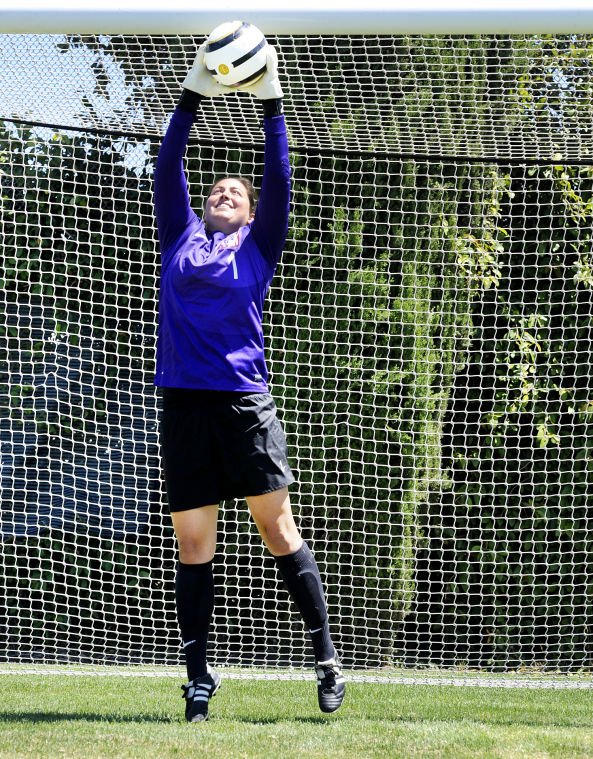
Meghan Maiwald looks like your average soccer player.
She wears her hair in a smooth pony tail, has toned legs and arms from years of training and play. She proudly wears her shirt and shorts bearing her team’s name and logo — USA Deaf Soccer.
Yes, Maiwald is deaf and has been since birth, but that has never stopped her from pursuing her passion. In fact, it’s quite the opposite. Soccer has become her connection to the hearing world.
“It’s a big part of my life. I’ve been playing since I was five, I’m 23 now — so that’s 17, 18 years,” the six-foot-tall goaltender said. “On the field, it’s a level playing field. That’s why I’m a goalkeeper. Everything is front of me and it’s easier to communicate when it’s more of a one-way communication. There’s nothing behind me, it’s much easier.”
Maiwald will showcase her skills on the international level when her and her team head to Sofia, Bulgaria to compete in the 22nd Summer Deaflympics on July 26. The team is aiming to bring home its fourth gold medal, solidifying its slogan of being ‘The best team you’ve never heard of.’
As the team’s goalie, Maiwald’s role in capturing another medal is vital. But coach Yon Struble isn’t worried, he has complete trust in her abilities.
“She’s just solid. She doesn’t make mistakes,” Struble said. “She’s a leader, a captain. She’s got good hands and her size is an attribute. She’s a solid keeper and the bottom line is that she just doesn’t make mistakes. She makes the saves she needs to make and she does a tremendous job because of it.”
Though she fell in love with soccer at an early age, Maiwald often considered herself the odd one out. She played on all-hearing teams in Gilroy and Morgan Hill and said she never quite fit in because of her deafness. At 15, all that changed.
While playing soccer for Leigh High School in San Jose, Maiwald was shown a newspaper article on the USA Deaf Soccer Team by her assistant coach. In that moment, she knew her experience with soccer would never be the same. Suddenly, her deafness wasn’t the thing about her that people would remember. Instead, her talent between the pipes would be the center of attention.
As part of the team, Maiwald had the opportunity to go places she never thought possible — from as far away as Turkey to middle American cities like Kansas City and everywhere in between.
“It’s a life changing experience,” the Gilroy native said. “The last two years have just been an unbelievable time in my life. Going to Turkey last summer was an eye opening experience. … It’s been an amazing ride, traveling around the country through soccer to different places.”
In addition to playing for the USA Deaf Soccer Team, Maiwald also plays for San Jose State University and the California Storm Elk Grove, a Women’s Professional Soccer League team.
It’s no surprise to her family that Maiwald has evolved into a stellar athlete. As an infant, she was incredibly active — so much so that her parents didn’t discover her deafness until she was 18 months old.
Though it was a shock to the family, they knew they wanted her to have as normal as a life as possible.
“We wanted her to fit in and be part of the hearing world,” Maiwald’s father Kevin said. “We thought the best way to do that was though sports. I’ve done sports all my life. In fact, that was a great way to do it.
“I couldn’t be prouder. I can’t even put into words how proud I am of her. She has exceed all her goals. She’s always had a goal. We watched the 1999 U.S. Women’s (team) beat China with Brandi Chastain scoring a goal. She said ‘Popa, one of these days I want to meet her and I want to play with her.’ Well that came to pass. It’s pretty darn awesome.”
Maiwald had the opportunity to play alongside female soccer legends like Chastain, Sissi, Aly Wagner and Tiffany Milbrett, a dream come true for any young athlete. But growing up she found herself struggling to find a deaf athlete to relate to. The women on the USA Deaf Soccer filled that void.
“It was inspiring to see all these older women who were very successful in their lives — they have full-time careers and families,” Maiwald said. “They are very successful and proud in their deaf identity. That opened my eyes.”
Sports have not only benefited Maiwald, but also her younger brother Sean who was also born deaf. He was a track and field standout at Leigh High School and now plays Division III football at Gallaudet University, an all-deaf school in Washington D.C.
“There’s nothing those kids can’t do,” father Kevin said of his children. “They have their own culture and they love it, but they also love being part of the hearing world. It makes them whole. It’s pretty cool.”
Maiwald only hopes that teams like her’s continue to exist. Without support from the U.S. Soccer Federation, players are finding it more and more difficult to afford to play. The travel and competition expenses fall on the athletes. Quite simply, they are paying to play.
The success of teams like this is especially important to Maiwald, who wants want to teach and coach children with backgrounds similar to hers. Without sports, she said, she would never be where she is today.
“It helped my self esteem, my confidence, my connection to the hearing world,” Maiwald said. “It helps me fit in. I’m a shy, quiet person; I keep to myself. Soccer is how I express myself. Kids need to be involved — even children with disabilities. It’s been amazing for me.”














